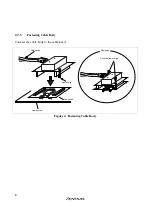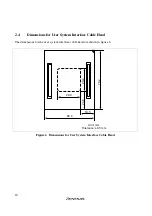
14
Section 4 Verifying Operation
1. Start up the emulator according to the procedures described in the H8/3048 Group, H8/3052
Group, H8/3062 Group, H8/3067 Group, H8/3007 Group E6000 Emulator User's Manual
(HS3064BEPI61HE).
2. Verify the user system interface cable connections by accessing the external memory and ports
to check the bus states of the pins with the MEMORY_FILL command (emulator command).
If an error is detected, recheck the soldered IC socket and the location of pin 1.
3. The emulator connected to this user system interface cable supports two kinds of clock
sources: an emulator internal clock and an external clock on user system. For details, refer to
the H8/3048 Group, H8/3052 Group, H8/3062 Group, H8/3067 Group, H8/3007 Group E6000
Emulator User's Manual (HS3064BEPI61HE).
⎯
To use the emulator internal clock
Select the clock in the emulator station as the system clock (
φ
) by using the CLOCK
command (emulator command).
⎯
To use the external clock on the user system as the system clock
Select target clock t or t2 with the CLOCK command (emulator command). Supply the
external clock from the user system to the emulator by inputting the external clock from
the EXTAL terminal on the cable head or connecting a crystal oscillator to the XTAL and
EXTAL terminals. For details, refer to the section of Clock Pulse Generator, in the
H8/3048 Group, H8/3052 Group, H8/3062 Group, H8/3067 Group, H8/3007 Group
Hardware Manual.
Figure 9 shows the clock oscillator circuit on the user system interface cable.
R2 270
Ω
R1 1 M
Ω
HCU04
HCU04
HCU04
To E6000 emulator
EXTAL
XTAL
Figure 9 Clock Oscillator Circuit







































